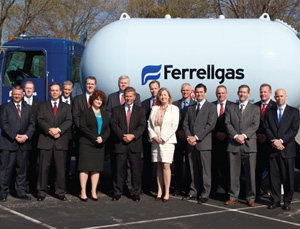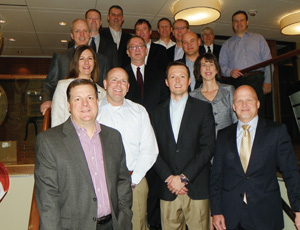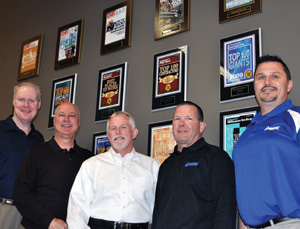
(front row, l–r): Randy Warner, VP-Safety; Troy Prewitt, VP-Corporate Development; Cathy Brown, VP-Tax & Human Resources; Boyd McGathey, EVP & COO; Robin Lewis, VP, Fleet, Procurement and Asset Management; Jimmy Ainsworth, VP, Transportation; Jack Herrold, VP-Accounting/Asst. Controller; Scott Brockelmeyer, VP, Corporate Communications & Marketing. (back row, l–r): Tom Van Buren, Sr. VP, Ferrell North America; Jeff Hall, VP-Operations Analysis; Jeff McCall, VP-Internal Audit; Al Heitmann, Sr. VP-Finance & Investor Relations; Ryan VanWinkle, EVP-CFO; Bill Evans, VP-Information Technology; Merle Edington, VP-Operations; Steve Wambold, President & CEO.
FERRELLGAS PARTNERS
This is about as plainspoken a success incentive as you’ll find: When Ferrellgas thrives, employees implicitly prosper because they own a 30 percent stake in the nation’s second-largest propane distributor. Since the employee stock ownership plan was formed in 1998, the value of each share has risen 445 percent, something a lot of us wish we’d seen in our 401(k)s. Did we say 401(k)? Ferrellgas employees have those available to them, as well, with a company match. The third leg of the compensation stool is an incentive bonus program—all of this from a company that, as the nation’s second-largest distributor of propane, sets standards for compensation levels in that sector. “Like any successful business, Ferrellgas has aggressive growth goals,” says Scott Brockelmeyer, vice president for communications. “We owe it to ourselves as employee-owners and to our public unitholders (Ferrellgas is publicly traded on the New York Stock Exchange) to relentlessly pursue these goals.”
With employees making decisions in the best interests of the company, and holding one another accountable, the result is a fun, creative and teamwork-driven environment, he says. And in the C-suites at corporate, employees find additional inspiration: CEO Steve Wambold, CFO Ryan VanWinkle and COO Boyd McGathey all rose to their current positions from the low-level managerial jobs they started with in the late 1990s.
Beyond the compensation and career-track considerations, the company offers a cafeteria-style plan based on benefit dollars that may be used to purchase the specific goodies from the Ferrellgas benefit cart. Among them are health, prescription medication, dental, vision and life insurance, disability plans, and Ferrellgas offers them as a self-insurer; the company itself pays the employer portion of all employee medical claims, not an insurance company. Coming straight off the bottom line, it’s another incentive for employees to take responsibility for their health and help manage the costs of their care. And—naturally—employees receive discounts on propane, much to the envy of the backyard grillmaster in all of us.

Executives from the leadership team at the Kansas City offices of BKD, LLP. Company officials say new initiatives to show appreciation for employees have been integral to the firm’s growth.
BKD, LLP
Communication and commitment. When times get tough, you build work-force loyalty by raising the ante on both. Through recession and recovery, the accounting and consulting firm BKD went all-in because, as managing partner Barry Davis said, if your goal is driving growth, “it’s vital to keep spirits up and provide open lines of communication at all levels.”
BKD did that by forming employee-appreciation and employee-engagement committees, and used all-employee breakfast meetings every other month to help communicate updates and news. The appreciation day, firm picnic and a holiday gathering to help employees relax outside of work are just a few ways that let employees know they’re appreciated and keep them optimistic, Davis said. The commitment piece? While many companies decided to cut benefit programs during the recession, BKD didn’t. “In fact, we enhanced some of the existing benefits with little or no premium increases,” Davis said. “Our greatest employee benefits challenge during this period was the same as everyone else—staying on top of double-digit increases in our health-care costs.” So the firm helped offset that by raising its share paid health-care costs by as much as 15 percent.
In additiion to 10 paid holidays each year, paid time off at BKD accumulates monthly, tied to length of service, and full-time employees can buy five additional days off every year. On the financial side, eligible employees may contribute up to 50 percent of their pretax salaries to the 401(k) plan, which has a company match. The insurance suite provides medical coverage—with flexible spending options available—as well as plans for dental, vision, life and disability.
But the benefit that may be most valued by employees, Davis said, is what the company invests in their ability to perform: “I believe our employees appreciate the training and development opportunities we offer for new employees and continuing education throughout their entire career,” he said. “It allows our employees to grow into new roles, interact with other BKD offices’ employees and provides many oppor-tunities for growth on both personal and professional levels.”

(l–r): Mike Teahan, Vice President/Treasurer; Mike Kotubey, President; Keith Flowers, Vice President Construction Planning; Keith Andrews, Executive Vice President; Mike Chick, Vice President Service and Special Projects. (not pictured): Brent Hawley, Vice President Field Operations.
MMC CONTRACTORS
What is, hands down, the most popular benefit accorded to employees of MMC Contractors? “Participation in our employee stock-ownership program,” says Mike
Kotubey, president of the Kansas City company formerly known as Midwest Mech-anical Contractors. That program helped MMC earn Best Companies to Work For status in 2009, and it’s one reason the firm is back again this year.
What’s the special appeal of that ESOP? “Both the financial benefit each employee gains from being an employee-owner and the team-oriented culture it promotes,” Kotubey says.
Even before onset of the contracting downturn in 2009, the company was undergoing a strategic redirection. And good thing, too: Because of it, Kotubey said, MMC has been able to weather the economic turmoil that followed, expand employment levels while other construction companies were slashing payrolls, and maintain salaries, benefits and bonuses. “We were able to stay in front of the challenges that others faced and actually had some of our best years over the last five years,” he said.
Those outcomes flow in large part from his own philosophy, which holds that growth is within the control of the leaders of any organization. “They can choose success and growth or succumb to negative group-think,” Kotubey said. “Our team chose to control our future and lead our team accordingly.”
That has paid off for 163 local employees and nearly 600 throughout the company, who enjoy not only ownership stakes, but a 401(k) savings plan, comprehensive health, vision and dental insurance plans—including health-savings accounts, flexible-spending accounts and both PPO and HMO options—as well as paid holidays and paid time off. There are employment anniversary celebrations, wellness programs and an on-site fitness center.
“Health care continues to be a challenge,” Kotubey said. “The costs continue to rise and the markets we are
in continue to become more competitive every year.” But through the implementation of wellness programs, the ongoing re-evaluation of benefits evaluation and education/training for both management and employees,” we have managed to maintain all our benefits at comparable levels to five years ago with just a minimal impact on the cost to each employee.”